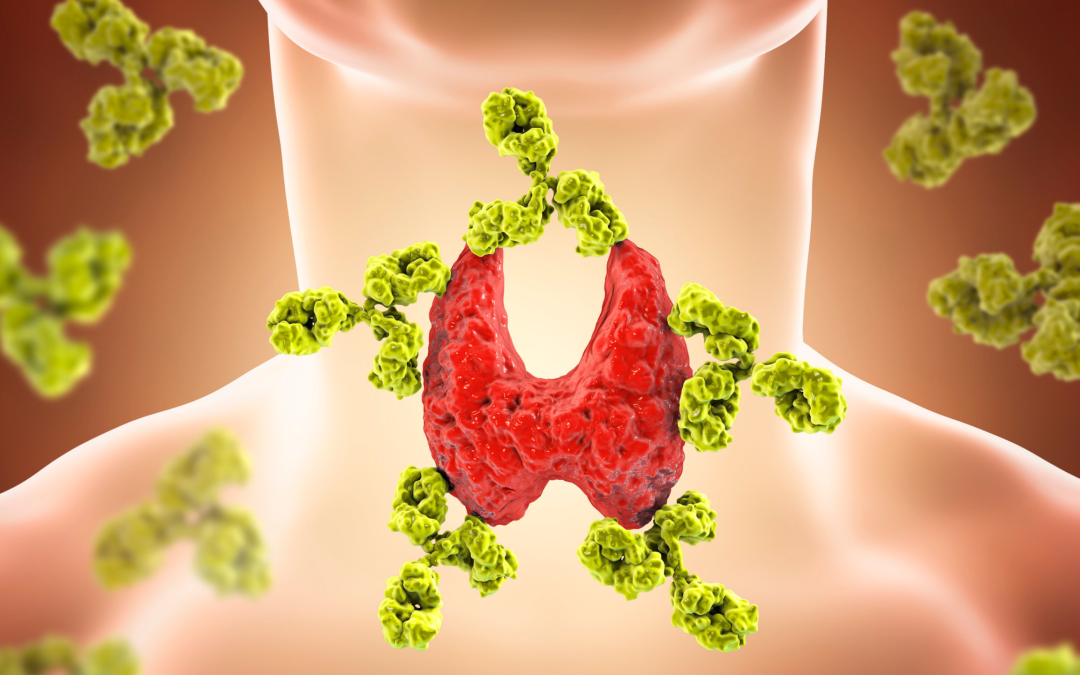HASHIMOTOS THYROIDITIS also known as chronic lymphocytic thyroiditis and Hashimoto’s disease, is an autoimmune disease in which the thyroid gland is gradually destroyed. Early on, symptoms may not be noticed. Over time, the thyroid may enlarge, forming a painless goiter. Some people eventually develop hypothyroidism with accompanying weight gain, fatigue, constipation, depression, hair loss, and general pains. After many years the thyroid typically shrinks in size. Potential complications include thyroid lymphoma. Furthermore, because it is common for untreated patients of Hashimoto’s to develop
hypothyroidism, further complications can include, but are not limited to, high cholesterol, heart disease, heart failure, high blood pressure, myxedema, and potential pregnancy problems.

Hashimoto’s thyroiditis is thought to be due to a combination of genetic and environmental factors. Risk
factors include a family history of the condition and having another autoimmune disease. Diagnosis is confirmed with blood tests for TSH, T4, and antithyroid autoantibodies. Other conditions that can produce similar symptoms include Graves; disease and nontoxic nodular goiter.
Hashimoto’s thyroiditis affects about 5% of Caucasians at some point in their lives. It typically begins
between the ages of 30 and 50 and is much more common in women than men. Rates of the disease
appear to be increasing.

Many symptoms are attributed to the development of Hashimoto’s thyroiditis. The most common symptoms include: fatigue, weight gain, pale or puffy face, feeling cold, joint and muscle pain, constipation, dry and thinning hair, heavy menstrual flow or irregular periods, depression, panic disorder, a slowed heart rate, and problems getting pregnant and miscarriages.
If left unchecked the progressive autoimmune condition can result in the destruction of the thyroid gland and leads to Hypothyroidism. The immune system attacks the protein of the thyroid called thyroglobulin (thyroid peroxidase) which is an enzyme involved in thyroid hormone production Blood tests reveal elevated thyroglobulin (TG or thyroid peroxidase), elevated TSH and a decrease in T3 and T4 production.
There are 5 stages of Hashimoto’s Thyroiditis:
1.Genetic Predisposition
2.Immune Cell Infiltration of the Thyroid Gland
3.Subclinical Hypothyroidism
4.Overt Hypothyroidism
5.Progression to Other Autoimmune Disorders

In GRAVE’S DISEASE, the immune system attacks the thyroid stimulating receptors (TSH-R) on the thyroid gland, causing TSH-R antibodies (also known as TRAb) to be formed, including thyroid stimulating immunoglobulin (TSI) and TSH-binding inhibiting immunoglobulin(TBII). The increased levels of these antibodies inhibit TSH production which often leads to an increase it T3 and T4 production, The increase causes a stimulatory effect on the body which can also increase the thyroid size causing a goiter or swollen thyroid, toxic multinodular goiter or toxic nodules.
There can also be a genetic predisposition that many autoimmune conditions that run-in families some include celiac disease, rheumatoid arthritis, vitiligo, diabetes mellitus type 1, systemic sclerosis, myasthenia gravis, Sjogren’s syndrome, Addison’s disease and systemic lupus erythematous.
Treatment- while there is no cure for Hashimoto’s or Graves disease there are measures to put your autoimmunity into remission. This has been achieved by eliminating underline triggers and thyroid antibodies. These triggers are often related to food sensitives, nutrient depletions, toxins, stress, dysbiosis. Herbal support includes Bugleweed, Motherwort, Lemon Balm glutathione, selenium, L-carnitine and Low dose Naltrexone.
At Monarch we are familiar with thyroid problems and work to understand your symptoms We know that certain medications or drugs have been associated with altering and interfering with thyroid function. Recently studies have indicated a possible side-affect with vaccination.

References
1. Mincer DL, Jialal I. Hashimoto Thyroiditis. In: StatPearls. Treasure Island (FL): Stat Pearls Publishing; September 28, 2021.
2. Croce L, De Martinis L, Pinto S, et al. Compared with classic Hashimoto’s thyroiditis, chronic autoimmune serum-negative thyroiditis requires a lower substitution dose of L-thyroxine to correct hypothyroidism – journal of endocrinological investigation. SpringerLink.
https://link.springer.com/article/10.1007/s40618-020-01249-x. Published April 21, 2020.
3. Thyroid pharmacist .com by Izabella Wentz, PharmD, July 3, 2020.
4. Wikipedia: https://en.wikipedia.org/wiki/Hashimoto%27s_thyroiditis
5. National Library of Medicine, Thyroid dysfunction following vaccination with COVID-19 vaccines: a basic review of the preliminary evidence. https://www.ncbi.nlm.nih.gov/pmc/articles/PMC8960081/
* These statements have not been evaluated by the Food and Drug Administration. The product mentioned in this article are not intended to diagnose, treat, cure, or prevent any disease. The information in this article is not intended to replace any recommendations or relationship with your physician. Please review references sited at end of article for scientific support of any claims made.

Franca Gardner
ANP-BC, DiHom

